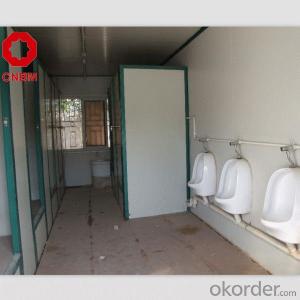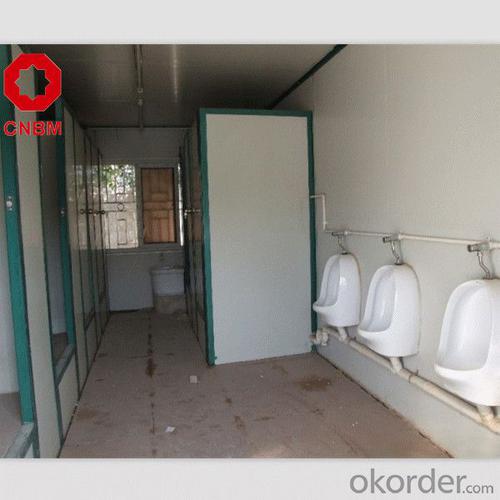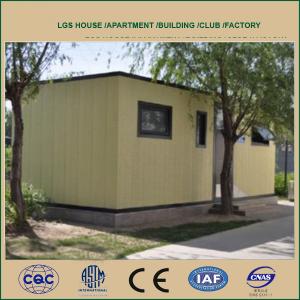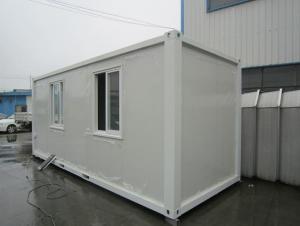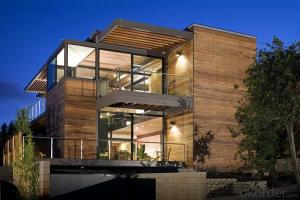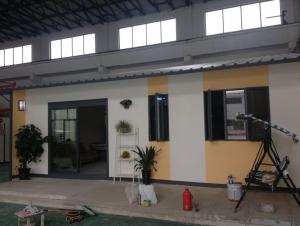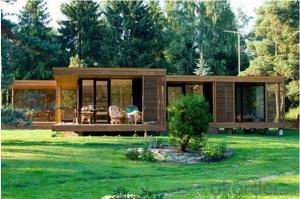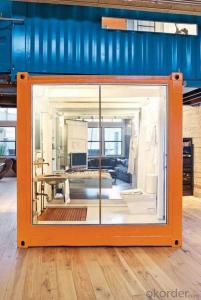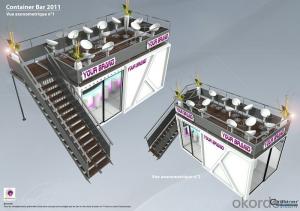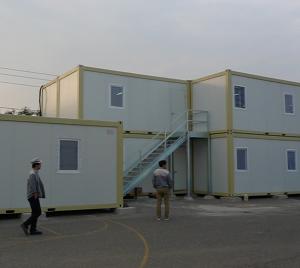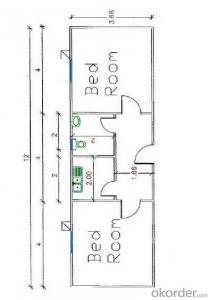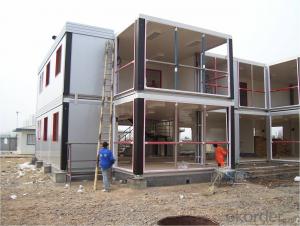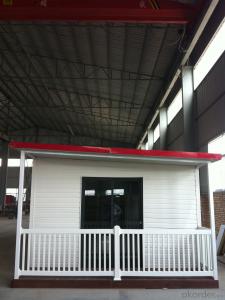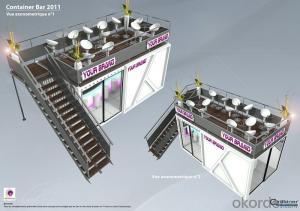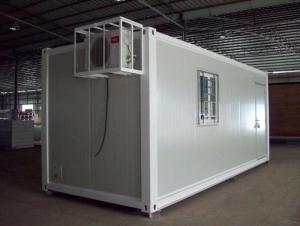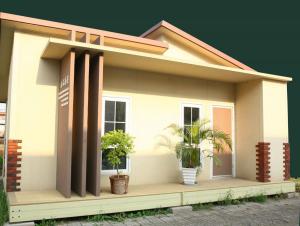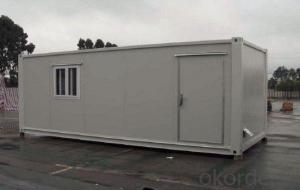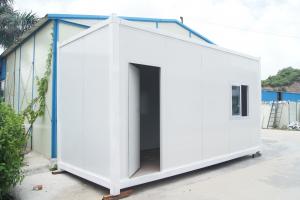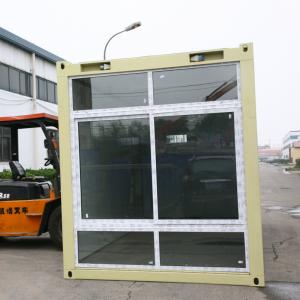Container House for Living Office Toilet Bathroom Shower
- Loading Port:
- Tianjin
- Payment Terms:
- TT OR LC
- Min Order Qty:
- 1 set
- Supply Capability:
- 1000 set/month
OKorder Service Pledge
OKorder Financial Service
You Might Also Like
Container House with Prefabricated House ;Movable Container House :
mobile container hotel house
Movable Container House :
20ft Container House,Movable House,Prefab House,Mobile House,Modular House,Low-cost Office,Toilet,Shower
Specification: 5910*2438*2591mm
No. | Part Name | Material |
1 | Foundation | Square Tube |
2 | Corner Post | Steel |
3 | Floor Beam | C Shape Steel |
4 | Roof Beam | C Shape Steel |
5 | Connection Plate | Steel |
6 | Edge Covering | Steel Plate |
7 | Wall | Sandwich Panel, optional |
8 | Flooring | Plywood+Vinyl Flooring/Laminate Flooring, optional |
9 | Roof | Corrugated Sandwich Panel, optional |
10 | Door | Sandwich Panel with aluminum doorframe |
11 | Doorlock | Stainless Steel |
12 | Window | Plastic Steel or Aluminum |
Plan:
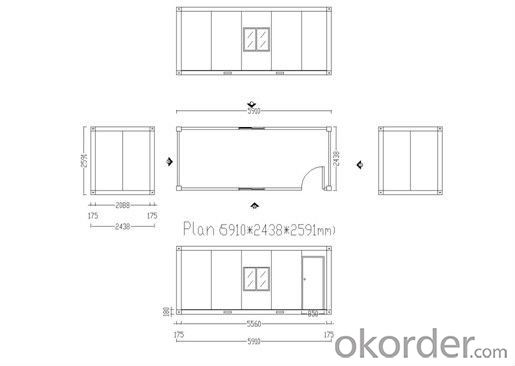
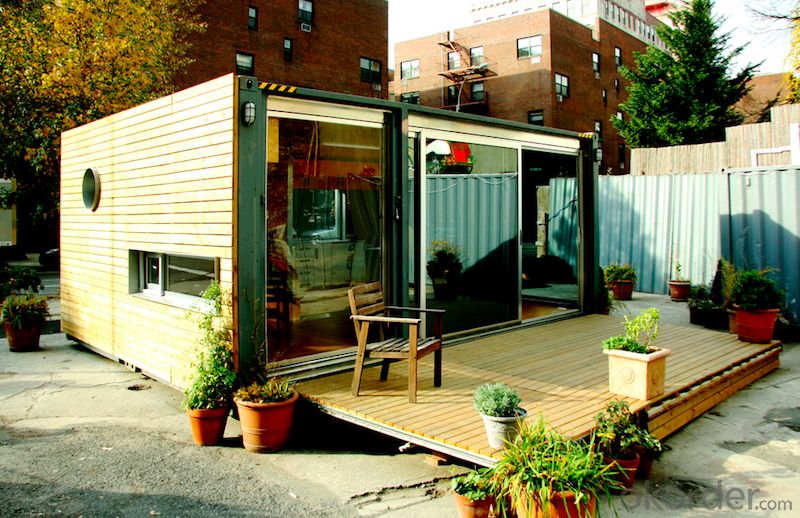
- Q: Are container houses considered sustainable housing options?
- Yes, container houses are considered sustainable housing options. They are made from repurposed shipping containers, which reduces waste and carbon emissions associated with traditional construction materials. Additionally, container houses can be designed to be energy-efficient, incorporating solar panels, rainwater harvesting systems, and insulation to lower environmental impact.
- Q: Are container houses resistant to high winds?
- Yes, container houses are generally resistant to high winds. The sturdy steel construction of shipping containers makes them durable and able to withstand strong winds. However, the overall wind resistance of a container house can also depend on its design, foundation, and additional reinforcements.
- Q: Can container houses be designed for agricultural or farming purposes?
- Container houses have the ability to be designed for agricultural or farming purposes. Due to their versatility, container houses are well-suited for a variety of applications, including agriculture and farming. Farmers can customize and modify container houses to meet their specific needs, creating a comfortable and efficient space for various agricultural activities. Farm offices, storage facilities, and even living spaces for farmers and farmworkers can be provided by container houses. By incorporating proper insulation, ventilation, and electrical installations, container houses can create a suitable environment for storing agricultural equipment and supplies. Additionally, they can serve as temporary housing for seasonal workers or permanent residences for farmers. Container houses can be easily transported and assembled, allowing farmers to have flexible and portable structures on their agricultural land. This flexibility is particularly advantageous for farmers who need to relocate their operations or expand their farming activities to different locations. Furthermore, container houses can be equipped with hydroponic or aquaponic systems, enabling farmers to grow crops without soil or with minimal water usage. These systems can be seamlessly integrated into the design of container houses, resulting in an efficient and sustainable environment for cultivating crops. In conclusion, container houses present a cost-effective and adaptable solution for agricultural and farming purposes. They can be tailored to meet the specific requirements of farmers, providing a comfortable living or working space while facilitating sustainable farming practices.
- Q: Can container houses be designed with a large outdoor patio?
- Yes, container houses can definitely be designed with a large outdoor patio. In fact, one of the benefits of using shipping containers for housing is their versatility and adaptability. Container homes can be customized to include various outdoor spaces, including patios, decks, and balconies, depending on the design and layout chosen. The size and layout of the patio will depend on the available space and the specific design goals of the container house. With proper planning and creative design, container houses can seamlessly integrate a spacious and functional outdoor patio, providing homeowners with the opportunity to enjoy outdoor living and entertainment areas.
- Q: Can container houses be designed with a skylight?
- Yes, container houses can definitely be designed with a skylight. In fact, adding a skylight to a container house can be a great way to enhance natural lighting and create a more open and spacious feel. Skylights can be incorporated into the roof of a container house, allowing natural light to flood in from above, brightening up the interior and reducing the need for artificial lighting during the day. Additionally, skylights can provide a connection to the outside world, offering views of the sky, stars, and even trees, depending on the location and positioning. With proper design and installation, container houses can easily accommodate skylights, making them a popular choice for those seeking a unique and sustainable living space.
- Q: Can container houses be built with a Scandinavian design?
- Yes, container houses can definitely be built with a Scandinavian design. Scandinavian design is known for its simplicity, functionality, and minimalism, which can be easily adapted to container homes. With the right architectural and interior design choices, container houses can incorporate the clean lines, light colors, natural materials, and cozy aesthetics that are characteristic of Scandinavian design.
- Q: Are container houses suitable for eco-friendly living?
- Container houses can indeed be a suitable option for eco-friendly living. These houses are made from repurposed shipping containers, which reduces the demand for new construction materials and minimizes waste. By reusing these containers, we are effectively recycling and reducing the carbon footprint associated with traditional housing construction. Additionally, container houses can be designed to be energy-efficient. With proper insulation and ventilation systems, these houses can effectively regulate temperature, reducing the need for excessive heating or cooling. This helps to conserve energy and lower greenhouse gas emissions. Furthermore, container houses lend themselves well to incorporating sustainable features. They can be equipped with solar panels to generate clean, renewable energy, reducing reliance on fossil fuels. Rainwater harvesting systems can also be installed, enabling homeowners to collect and reuse water, conserving this valuable resource. Container houses also promote sustainable living by encouraging minimalist lifestyles. The limited space within these houses encourages individuals to declutter and live with less, reducing consumption and waste. This minimalist approach aligns well with eco-friendly living principles. However, it is important to note that the sustainability of container houses is also dependent on the materials and practices used during the conversion process. It is essential to ensure that eco-friendly materials are used for insulation, flooring, and finishes, and that the conversion process itself is carried out in an environmentally responsible manner. Overall, container houses can be a suitable option for eco-friendly living. They offer the benefits of recycling and reducing waste, energy efficiency, and the potential for incorporating sustainable features. However, it is important to consider the entire lifecycle of the house, from construction to ongoing maintenance, to ensure that it truly aligns with eco-friendly living principles.
- Q: Are container houses suitable for military or remote camps?
- Military or remote camps can benefit greatly from the use of container houses. These unique structures have become increasingly popular in recent years because of their versatility, affordability, and ease of transport. These characteristics make them an ideal choice for military or remote camps where quick setup and mobility are of utmost importance. One major advantage of container houses in these settings is their exceptional durability. Constructed from steel, these containers are designed to withstand even the harshest weather conditions. This makes them highly resilient in remote locations or conflict areas, where extreme temperatures, strong winds, and heavy snow loads are common. As a result, they provide a safe and secure shelter for military personnel or remote camp workers. Furthermore, container houses can be easily modified and customized to meet specific needs. The interior layout, insulation, and amenities can all be tailored to create comfortable living conditions for the occupants. These structures can be equipped with electrical and plumbing systems, heating and cooling units, and other necessary facilities, ensuring the well-being of those residing in the camp. Another advantage of container houses is their mobility. With the need for frequent movement in military operations, these structures can be easily transported and relocated as required. Whether by land, sea, or air, container houses can be stacked or loaded onto trucks, ships, or planes, allowing for efficient and rapid deployment. Moreover, container houses offer cost-effective solutions for military or remote camps. In comparison to traditional construction methods, these structures are significantly more affordable. They are readily available, and the overall cost of purchasing, modifying, and transporting containers is generally lower than that of constructing permanent buildings. This cost-effectiveness allows military or remote camps to allocate their budgets to other essential needs. In conclusion, container houses are well-suited for military or remote camps due to their durability, customization options, mobility, and cost-effectiveness. These structures provide a safe and comfortable living environment for military personnel or remote camp workers, while also offering the flexibility and mobility required in such settings.
- Q: Can container houses be built with a covered patio or outdoor kitchen?
- Yes, container houses can be built with a covered patio or outdoor kitchen. Since container houses are highly customizable and can be designed to fit specific needs, adding a covered patio or outdoor kitchen is entirely possible. The containers can be modified to include a covered outdoor space, such as a patio, by removing sections of the container walls and adding a roof structure. This allows for an outdoor area that can be protected from the elements. Additionally, containers can be modified to include an outdoor kitchen by installing countertops, sink, grill, and other necessary appliances. The design possibilities for container houses are endless, and with the right modifications, a covered patio or outdoor kitchen can be seamlessly incorporated into the overall structure.
- Q: Can container houses be built with a security system?
- Yes, container houses can certainly be built with a security system. In fact, just like traditional houses, container houses can be equipped with a variety of security features to ensure the safety and protection of the residents. To begin with, container houses can have the same types of security systems as traditional houses, such as burglar alarms, motion sensors, and security cameras. These systems can be installed at various entry points, including doors and windows, to detect any unauthorized access or suspicious activity. Additionally, container houses can also utilize smart home technology to enhance security. This includes features like smart locks, which can be controlled remotely through a smartphone app, ensuring that only authorized individuals can enter the premises. Integration with a home security system can also allow for alerts and notifications to be sent to the homeowner's phone in case of any security breaches. Furthermore, container houses can be reinforced with security measures that are unique to their structure. For instance, the strong steel walls of container houses can act as a deterrent to potential intruders. Windows can be reinforced with security films or bars, and doors can be fitted with sturdy locks and deadbolts. Ultimately, the level of security in a container house can be customized to meet the specific needs and preferences of the homeowner. Whether it's basic security measures or advanced smart home security systems, container houses can be built to provide a safe and secure living environment.
Send your message to us
Container House for Living Office Toilet Bathroom Shower
- Loading Port:
- Tianjin
- Payment Terms:
- TT OR LC
- Min Order Qty:
- 1 set
- Supply Capability:
- 1000 set/month
OKorder Service Pledge
OKorder Financial Service
Similar products
Hot products
Hot Searches
Related keywords
